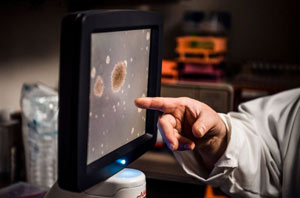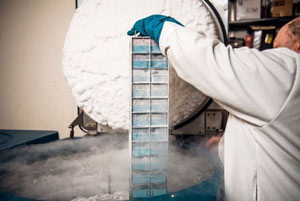Cancer Research Cores and Shared Resources

At Henry Ford Cancer, we thrive on collaboration. Many of the questions our researchers pursue cross boundaries between cancer types and treatment methods.
Our investigators not only work together across disciplines, but also share tools and information. This close engagement includes our designated cancer research cores as well as other resources that support our cancer research activities.
Clinical trials office
Our clinical trials office provides support for research studies to evaluate and develop new treatments. The office’s services include:
- Case management
- Computer programming and database design
- Data management
- Financial management
- Institutional Review Board (IRB) coordination
- Pharmacokinetics/central lab submission
- Regulatory maintenance
Get more information about the clinical trials office.
We also offer consultations for researchers who are preparing a proposal to the National Institutes of Health in certain research areas. Learn more about our clinical trials expertise.
Cancer tissue biorepository

Since 1999, Henry Ford has maintained samples of a wide range of cancer and benign tissues. These samples – including more than 5,000 prostate samples – allow researchers to study samples through the entire course of diagnosis and treatment.
Get more information about the cancer tissue biorepository.
Biostatistics, data collection and management core
This core provides access to masters- and doctoral-trained statisticians and epidemiologists who help researchers store, analyze and evaluate data. Our experts are familiar with maintaining and searching data from Henry Ford or other medical record databases to support population science studies.
This core provides assistance with:
- Biostatistics
- Computer programming and data management
- Data collection
- Epidemiology
- Molecular epidemiology research laboratory
Get more information about the biostatistics, data collection and management core.
Cancer cell sorting core
 Our core resources support researchers in sorting or enriching cells in all phases of the cell cycle. This core offers:
Our core resources support researchers in sorting or enriching cells in all phases of the cell cycle. This core offers:
- BD FACSAriaTM II cell sorter
- J6-MI centrifuge with Beckman JE 5.0 elutriation rotor
Get more information about the cancer cell sorting core.
Cell imaging and microscopy
Researchers can schedule time to use our advanced confocal microscope or laser-capture microdissector, with assistance available. Our available resources are:
- Arcturus PixCell® II Leica DM5500 B laser capture microdissecton
- Bio-Rad MRC 1024
Get more information about cell imaging and microscopy.
Animal imaging and monitoring
To support in vivo studies, we provide several tools, including several options for MR and CT imaging specifically for small animals. Our resources include:
- 7T MR systems
- Caliper LifeSciences Xenogen IVIS spectrum imaging system
- In-Vivo Multispectral FX PRO imaging system
- Micro-SPECT-CT in vivo small animal imaging system
- Zeiss LSM 510
Get more information about animal imaging and monitoring.
Pharmacokinetics core

The drug discovery and development cancer research program operates the pharmacokinetics core. This resource assists investigators who want to determine the outcome of substances administered to a living organism. We offer several types of separators and detectors, as well as technical assistance.
Get more information about the pharmacokinetics core.
SBIR/STTR submission advice/company development
Increasingly, cancer researchers and people who are developing therapeutics must establish a biotechnology company to bring their work to fruition. Henry Ford researchers can learn from experienced grant recipients how to secure Small Business Innovation Research and Small Business Technology Transfer (SBIR/STTR) funding.
Get more information about SBIR/STTR submission advice/company development.
.svg?iar=0&hash=F6049510E33E4E6D8196C26CCC0A64A4)

/hfh-logo-main--white.svg?iar=0&hash=ED491CBFADFB7670FAE94559C98D7798)